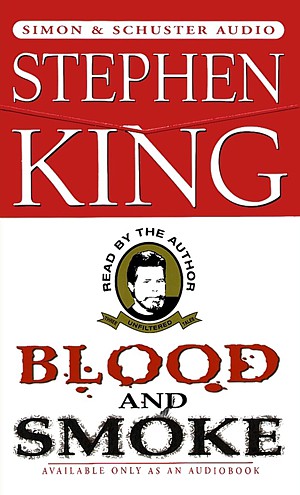 |
 |
Review by James Futch |
|

USA Release: Jan. 1, 2000 By Stephen King 2000 Simon and Schuster Inc. 3.5 hours running time. |
|||
Atlanta highway traffic is worsening everyday. Even with 6 to 8 lanes it routinely clogs up like the toilet in the bathroom at your girlfriend's house . . . you know, the one with no plunger, no window and is adjacent to the living room where she and her parents are waiting for you. And just like that treacherous throne of misery, your car becomes a metal tomb of nightmarish claustrophobia.
The radio seldom offers solace. There is only an endless stream of car dealership commercials literally screaming at you on every station and traffic reports telling you what you already know: you are deep in shit so just sit tight and get used to it. You can wrench your hair from your scalp, scream back at the car dealerships, or pound your knuckles into a bloody pulp against the dash but it won't move the car any faster than the car in front of you.
But for a few days this week, none of that mattered to me. Stephen King was along for the ride and, in that nasal Maine accent, magically took me far away from the pain of the commute.
BLOOD AND SMOKE is Stephen King's newest audio book from Simon and Schuster. Available on tape or CD (I got the CD's), it contains three stories, two of which have never seen publication in any other form. The stories, "Lunch at the Gotham Café", "1408", and "In the Deathroom", all revolve in some way around the theme of that most politically incorrect of vices, smoking. Even the packaging resembles an oversized pack of Marlboros (in the box, to be exact) with a nifty flip-top and a warning from the surgeon general on the side. It's a nice touch.
The first tale is Lunch at the Gotham Café, originally from the horror anthology DARK LOVE (1995) and then reprinted in THE YEAR'S BEST FANTASY AND HORROR: Ninth Annual Collection. Steve Davis, our hero, happens upon a note from his wife saying she's moved out and wants a divorce. No other explanation is given. During this time of stress and upheaval, Steve decides to chuck the cigarettes out the window and begins a period of physical and psychological withdrawal.
King's narratives of the symptoms that accompany nicotine withdrawal are not textbook derived but realistic descriptions of one who undoubtedly has suffered them first hand. Soon, Steve is in contact with her lawyer, and a lunch meeting at a trendy Manhattan café is scheduled to begin the divorce process. By the time the meeting rolls around, Steve Davis is drifting through a haze of unreality brought on by the nicotine receptors crying out for a fix.
The listener is sure he's going to lose it during the meeting (his own lawyer was suddenly called out of town) but that doesn't happen. Instead, King delivers a bloody surprise right out of left field that is forecasted only by a single drop of dried blood and a dog that isn't there. Naturally, I won't spoil it for those who haven't listened to it or read it so I'll stop the synopsis there.
What's important about Lunch at the Gotham Café is the fact that it is so character driven. We truly feel the pain of Steve Davis's withdrawal from nicotine and the separation from his wife, whose reasons for wanting a divorce are initially obscure. His decision to quit smoking in the sudden absence of his wife, whom he misses terribly, and the nerve wracking process of divorce, is sort of strange at first.
It would seem that during such a stressful period, undertaking so dreadful a task as quitting smoking would be the last thing on a man's mind. Rather, he would increase his nicotine intake, chain-smoking away into the small hours. But his reasons for quitting become clearer later on and there is a kind of logic to it that makes it all believable.
King is a genius at writing compulsively readable (or listen-able, in this case) stories and Lunch at the Gotham Café is no exception. There are passages in Lunch at the Gotham Café that I just had to rewind and listen to over again because the writing is like music. And there are one or two gut busters as well. In fact, in what is probably the most horrific scene in the story, one single word caused me to laugh so hard that I had to momentarily pause the story. The mix of horror, humanity, and humor are perfectly blended, like the tobaccos in a good smoke.
Next was 1408. Mike Enslin is an author of a cycle of true ghost stories called the Ten Nights series (Ten Nights in Ten Haunted Houses, Ten Nights in Ten Haunted Graveyards, etc). He begins his latest effort, Ten Nights in Ten Haunted Hotels, by planning to spend the night in the infamous room 1408, a supposedly haunted hotel room in New York City. Although he hasn't smoked a cigarette in many years, he wears one behind his ear like a pencil, changing it daily. Whether or not he will relapse is determined by whatever horrors he may witness in the haunted room 1408. If indeed it is even haunted.
What makes 1408 so effectively scary is King's use of the Donald Pleasance / Robert Shaw technique. Just as Donald Pleasance ominously built up the killer in Halloween and Robert Shaw did the same thing for the shark in Jaws, so too does the manager of the Dolphin Hotel drive up the fear quotient with his foreboding warnings to Mike. He begs the writer to reconsider his decision and give up the idea of spending the night in room 1408. It's obvious through his admonitions that he is afraid for the writer, who is determined to go through with it and then move on to the next location, The Overlook Hotel perhaps.
Naturally, Mike Enslin ignores the manager and all his spooky tidbits about room 1408 (watches and calculators stop working when in 1408 and lodgers of room 1408 have the strangest urge to exit the hotel by way of the window which is 13 floors up). What happens even before he crosses the threshold is not surprising (after all, the manager warned him) but is creepy nonetheless. 1408 proves that good old-fashioned ghost stories can still send shivers up the spine. King's top notch narrative on Mike's dwindling grip on reality and growing acceptance of the supernatural reminded me of some of the hallucinatory passages in It. There was a comfortable ease in the storytelling, a return to familiar ground, much like switching back to your favorite brand of smokes.
In the Deathroom is the final tale in the BLOOD AND SMOKE trilogy. And is the least of them too. The premise, about an American newspaperman named Fletcher facing torture and death while interrogated in the South American Ministry of Information, is intriguing but the story is really more of an occurrence than anything else.
Fletcher is there, in the death room, being tortured by Escobar, the dictator and his henchmen, Hines and Ramón, under the watchful eye of a female despot known only as The Bride of Frankenstein. While Escobar chain smokes Marlboros, he offers one to Fletcher, who has long since quit smoking, but finally decides there is no better time for recidivism than when being tortured with electroshock. The story has some satisfying moments but not enough pay-off at the end. Kind of like a generic lights 100 cigarette. The nicotine is there but just not the satisfaction and flavor.
The beginning and end of each story features some musical couplets that help set the mood. The only complaint I had about the whole package was with the CD's themselves. If you stop the CD, you have no way of returning to the place you left off except by fast forwarding or simply starting all over again. There are no sections that you can access quickly. Each story is like a CD length song. So if you are going to take a break, I recommend pausing instead of stopping to avoid the hassle of fast forwarding.
King's reading on BLOOD AND SMOKE is a far cry from the monotonous days of THE GUNSLINGER. Yes, his voice is nasal and yes, his accent is pure Maine-iac but I liked his reading. Because he wrote it, he knows how it should be read with just the right rhythm and dramatic panache. Even his interior dialogue, a style he uses extensively in his writing, comes through loud and clear without the benefit of italics. And during In the Deathroom King flexes his acting chops while reading the parts of Escobar with a hilarious Hispanic accent that is a definite highlight of the story.
Though many believe that King saturates the market, he's still a pleasure to return to after being away for a while. As cigarette junkies know (I'm a reformed one myself but smoked for 10 years before quitting) you gotta have that fix, be it nicotine or King. Overall, BLOOD AND SMOKE is excellent entertainment, filled with the macabre humor and realistic, likable (and unlikable too as the case may be) characters that elevate the tales beyond hack writing, like the kind of writing I imagine Ten Nights in Ten Haunted Castles to be. In fact, you know it's good stuff when you pull into the driveway and sit listening for ten extra minutes, even if you've just sat in traffic for an hour . . . without a single cigarette.
4 BookWyrms




This review copyright 2000 E.C.McMullen Jr.
| GET SOME CLOTHES ON | |
| FEO AMANTE'S HORROR THRILLER Created by: E.C.MULLEN JR. |
| COME FOLLOW ME @ Amazon |
| ECMJr |
| Feo Blog |
| IMDb |
| Stage32 |
| YouTube |
| Zazzle Shop |

